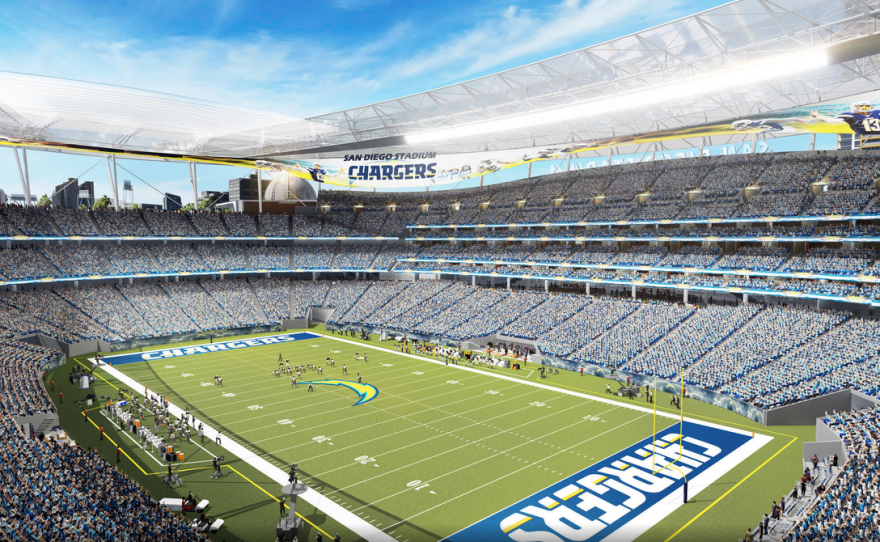The Chargers' plan to finance construction and operations of a downtown stadium and convention center annex would leave the city on the hook for more than $400 million, even if the team's estimates were realized, according to an analysis released Monday by the San Diego County Taxpayers Association.
The taxpayers group's 36-page analysis of Measure C, which will be on San Diego's November ballot, said the plan would produce $744 million in additional revenue over 30 years, less than the public contribution of around $1.1 billion.
The report took into account an increase in the hotel room tax, additional hotel room nights generated by events, revenue from non-football activities and a reduction in the city's expenses to maintain aging Qualcomm Stadium in Mission Valley.
Fred Maas, who is in charge of the stadium effort on behalf of the Chargers, criticized the report, calling it an "inside job" by project opponents "who are leading the effort to send the Chargers to L.A."
The Chargers and National Football League would contribute the rest of the stadium cost projected at $1.8 billion.
Taxpayers Association President Haney Hong said the analysis "is more than fair, and in fact gives the Chargers the benefit of the doubt." He noted that team officials refused to meet with the group.
"We took their publicly shared assumptions on additional hotel room nights and presumed, as they have in the past, that 25 percent of the team's fan base comes from outside San Diego," Hong said.
"We made optimistic assumptions that any additional seat in the new stadium would be filled by someone from out of town, every pre-season and home game, and doubled the likely revenue the city would get from other uses of the stadium," he said. "We still ended up with a shortfall of more than $400 from the hotel tax increase the Chargers are proposing."
Hong said the remaining debt would have to be paid from the city's general fund, which pays for basic services like public safety, libraries and recreation centers.
The Chargers have been pushing for a new stadium for 15 years and, in concert with the Oakland Raiders, put together a plan to build a facility in Carson, in Los Angeles County.
NFL owners rejected the proposal but granted Chargers Chairman Dean Spanos a lifeline — a chance to become the second team at a future stadium in Inglewood — if they couldn't work out a deal in San Diego.
Spanos subsequently announced he would try to build a 61,500-seat facility in the East Village near Petco Park and hired Maas to spearhead the effort.
"Not only did they convert the assets — their email list — of a tax- exempt enterprise for their political purposes, a particular fleece for a `taxpayers organization,' but they manufactured a financial report, which couldn't pass for a third-grade arithmetic homework assignment," Maas said of the report.
"If they force us to leave, they may get their own Fleece Award, but we, sadly, will be without our beloved Chargers."
The taxpayers group annually hands out awards for good and bad examples of government spending — the worst of them receiving a Golden Fleece.
Separately, the city's Independent Budget Analyst's office released a fiscal analysis that said the hotel room tax increase could generate between $1.3 billion and $1.6 billion for land acquisition and construction. With the additional contribution from the Chargers and NFL, enough money would be raised if the cost of the project is what the Chargers estimate.
Project expenses could increase if the cost of property, the need to relocate a Metropolitan Transit System bus yard and environmental mitigation rises, the IBA cautioned.





